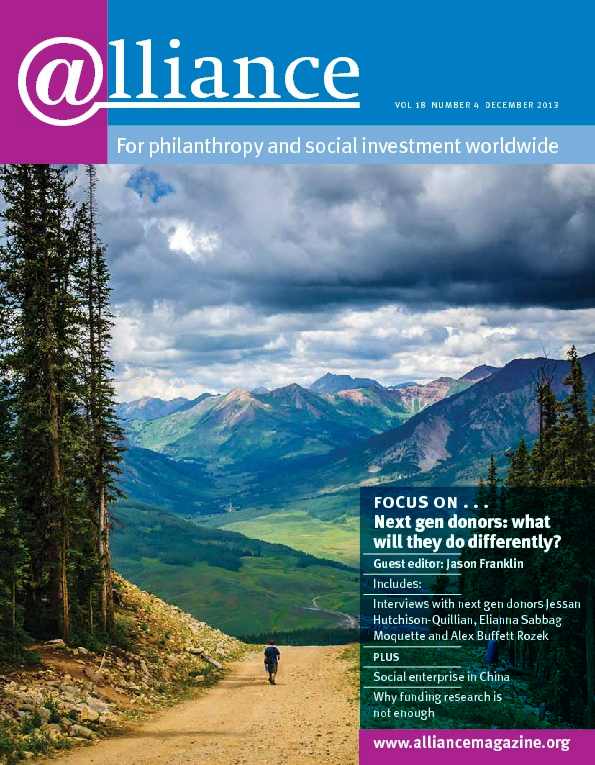At the start of October I was fortunate enough to be invited to the launch of Beth Breeze and Theresa Lloyd’s Richer Lives: Why rich people give. Focused on the motivations and giving practices of wealthy individuals in the UK, this is a follow-up study to Lloyd’s first book on the subject, published ten years ago. It’s a great read, full of insightful quotes from those included in the earlier book as well as from a new cohort of donors. There is not enough research in general in the UK about high-level giving and donor motivations, which was part of the reason we published Money for Good UK earlier this year, where we surveyed 3,000 high-income and mainstream donors across the UK. The more we collectively understand about what motivates people to give, and on the flipside what is holding their giving back, the better chance we will have of unlocking more donations.
 Richer Lives also provides a useful and comprehensive guide to changes in the world of UK philanthropy over the past decade. The book touches on some of these: the desire by donors to become more strategic, engaged and open about their giving, to focus on underlying problems rather than symptoms, and to achieve the greatest impact with their giving. As an instance of this, at NPC we’ve seen more individuals and families coming to us to help them set a clear plan for their giving, which includes understanding its results. We’ve also seen a step-change in the number of corporates approaching us in order to learn how to transform ad hoc giving into a focused programme.
Richer Lives also provides a useful and comprehensive guide to changes in the world of UK philanthropy over the past decade. The book touches on some of these: the desire by donors to become more strategic, engaged and open about their giving, to focus on underlying problems rather than symptoms, and to achieve the greatest impact with their giving. As an instance of this, at NPC we’ve seen more individuals and families coming to us to help them set a clear plan for their giving, which includes understanding its results. We’ve also seen a step-change in the number of corporates approaching us in order to learn how to transform ad hoc giving into a focused programme.
A really encouraging finding is that an overwhelming majority of Richer Lives interviewees think that the giving climate has improved in the UK over the past ten years. Eighty per cent of donors have increased their commitment to philanthropy over that time, while 67 per cent feel that public opinion is more positive than in 2002 due to people talking more openly about their giving, increased media coverage and greater awareness of the role of philanthropists.
However, barriers to giving still clearly exist. One of the key ones is the financial uncertainty most individuals face, which means they are never sure how much they can afford to give away. The inclusion of the Rosenberg principles in the appendices of Richer Lives is precisely for this purpose: to help people understand how much they can afford to give based on a basic financial assessment. It has always been our hope that more financial advisers should spend time with their clients not only discussing philanthropy in the first place but also helping them work out their needs and their ‘surplus income’.
Many donors are still concerned about what their money will be used for. More than half of respondents (53 per cent) believe that charities are inefficient in managing donations. ‘A lot of charities are run by good-hearted people, and that’s wonderful, but they’re not necessarily efficient or good at getting value for money.’ A similar proportion (57 per cent) of all donors think that fundraisers have become more professional over the past ten years, with comments such as ‘I sent £10,000 to the [x charity] and they sent a pro forma thank you letter. It still rankles 10 years later.’
But Richer Lives makes some good recommendations for different audiences to further improve the giving landscape, including suggestions that charities should improve their efforts in asking and after-care, as well as implementing more rigorous management processes to address donors’ lack of confidence in their competency and efficiency. It also calls for philanthropists themselves to help the charities they support with fundraising, acting as ambassadors and encouraging their peers to donate. At NPC we see this more regularly, and it’s proving an effective strategy.
While Richer Lives complements other studies of giving in the sector, what really stands out is its longitudinal approach: the aim is to repeat the study every ten years. On our wish list looking ahead to 2022 is a significant improvement in perceptions about the effectiveness of the charitable sector, and an increasing number of partnerships between donors, improving the impact of their joint funding. Here’s hoping we see progress in these areas and others over the next ten years.
Plum Lomax is deputy head of funder effectiveness at NPC. Email Plum.Lomax@thinkNPC.org
To order
http://www.dsc.org.uk/rlwrpg
Richer Lives: Why rich people give
Beth Breeze and Theresa Lloyd Directory of Social Change £15
ISBN 9781906294793






Comments (0)